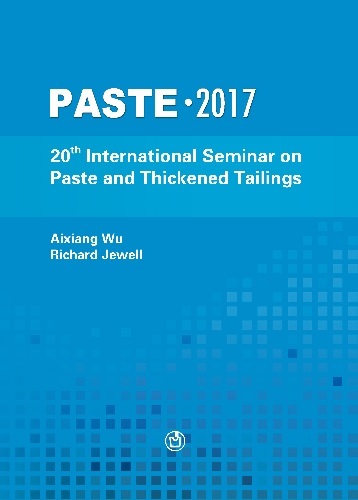A novel approach to polymer dissolution – modular CPS

|
Authors: Muhor, J; Utting, L; Michalczyk, R; Marcus, MA; Marcus, T |
DOI https://doi.org/10.36487/ACG_rep/1752_20_Muhor
Cite As:
Muhor, J, Utting, L, Michalczyk, R, Marcus, MA & Marcus, T 2017, 'A novel approach to polymer dissolution – modular CPS', in A Wu & R Jewell (eds), Paste 2017: Proceedings of the 20th International Seminar on Paste and Thickened Tailings, University of Science and Technology Beijing, Beijing, pp. 170-179, https://doi.org/10.36487/ACG_rep/1752_20_Muhor
Abstract:
Thickening of tailings material produced in the mining, chemical, water supply and sanitation industries started in 1905 in conventional thickeners that were used well into the 1960s. The development of water soluble polymer flocculants in mineral processing is necessary to make thickening, clarification and tailings treatment processes effective. BASF has a range of polymers that are used for these processes in a variety of industries. Ever increasing tonnages of low grade ore or the treatment of more challenging substrates have highlighted limitations in the conventional systems used for hydration and dissolution of polymers that make them ready for use. When these systems are pushed to nameplate capacity, field observations indicate that plant availability can be impacted with symptoms such as foaming, powder blockages and gelatinous masses limiting any improvements. Where significant process streams require treatment with a polymer, arguably the most economical product form is a powder, which is then pneumatically transferred into a storage silo. Hydration and dissolution of the polymer before use is typically conducted in batch process where separate powder storage, hydration tank and ageing tanks are used. These conventional systems, although scalable to an extent, have limitations and require large footprints, services and civils to allow the polymer to be effective. For example, typical systems of this design type are used where polymer dissolution rates or equipment duty required is < 500 kg/hr. These systems are typically made to order with lead times on detailed design, engineering and fabrication of up to six months. Limitations on hydration systems have been largely factored around powder handling, initial wetting out of the polymer while ensuring its integrity and maintaining the performance of the polymer. A novel approach was taken to designing a modular, continuous polymer system capable of producing 1600 kg/hr of dry polymer into concentrated solution with minimal civil requirements that was delivered within 6~8 months and has now been operating in a hostile environment for over two years. This paper focuses on design considerations for a Modular Continuous Polymer System (CPS).
References:
BASF Customer Engineering Solutions
Patterson and Cooke, ‘Thickener Course Notes’, pp. 13
© Copyright 2026, Australian Centre for Geomechanics (ACG), The University of Western Australia. All rights reserved.
View copyright/legal information
Please direct any queries or error reports to repository-acg@uwa.edu.au
View copyright/legal information
Please direct any queries or error reports to repository-acg@uwa.edu.au